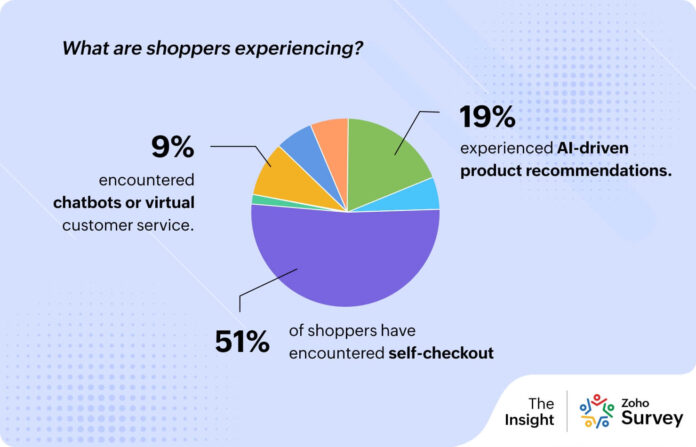Artificial intelligence (AI) is increasingly transforming the retail landscape, revolutionizing the way consumers shop and the way businesses operate. A recent Zoho survey of 1,500 shoppers shows the profound impact AI is having on the shopping experience this holiday season, while shedding light on the challenges retailers face in adopting this transformative technology.
Despite the rapid advances in AI technology, self-checkout kiosks remain the most adopted technological innovation among shoppers as they combine convenience with efficiency. AI-driven recommendations and chatbots are gaining traction, providing personalized shopping experiences and instant customer service. However, consumer sentiment toward these tools varies significantly.
Some buyers appreciate the AI's ability to streamline decision-making, with comments such as: “It focused on exactly what I wanted.” This reduces an activity that often requires an hour of thought into a few seconds.” Others find the experience intrusive or irrelevant, with one respondent noting, “The suggestions were irrelevant to me,” highlighting the inconsistency of the technology in meeting customer needs.
There are similarly divided opinions when it comes to AI-powered chatbots. Many people appreciate the quick help that these tools offer, especially for simple tasks. “It gave me some details that weren't in the product description,” one shopper noted. However, frustration remains for those seeking human interaction. One respondent said, “I can’t stand having to break through a chatbot to reach a real employee.”
The survey also found that 73% of shoppers prefer personal recommendations from friends over AI-driven suggestions, suggesting that while AI is on the rise, the human factor remains influential in shopping.
Impact of AI on Retail Operations
For retailers, AI has proven to be a game-changer in several areas. Predictive analytics and automation help companies optimize inventory, pricing and marketing, especially for fast-moving and seasonal products. Retailers have reported higher profitability in these categories, while niche markets benefit from AI's ability to effectively identify and serve smaller customer segments.
However, not all companies were able to achieve measurable success. Over 18% of retailers surveyed found that AI had no noticeable impact, highlighting the uneven adoption and effectiveness of the technology across the industry.
Obstacles to AI implementation
Retailers face significant challenges in adopting AI, with cost and expertise being the most pressing issues. Implementing AI systems requires significant investments in technology and staff training, making it a daunting task for smaller companies. A lack of skilled talent further complicates the transition and leaves many retailers struggling to effectively manage these sophisticated systems.
Consumer reluctance is also a barrier. Privacy and security concerns, as well as the perceived lack of human touch in AI-driven interactions, are contributing to slower buyer adoption.
Perhaps the most persistent challenge is measuring the return on investment (ROI) for AI initiatives. Nearly half of retailers see ROI assessment as a key barrier, indicating that it is difficult to quantify the impact of AI on sales and customer satisfaction.
The future of AI in retail
Despite these challenges, the evolution of AI in retail is clear: it is changing the industry. From personalized shopping experiences to streamlined operations, technology offers compelling benefits that are becoming increasingly difficult for retailers to ignore.
As AI continues to evolve, retailers must balance innovation with consumer expectations while addressing privacy and user experience concerns. While the path ahead is not without obstacles, AI will redefine the retail landscape and provide opportunities for companies willing to navigate the complexity.
Images: Zoho
















